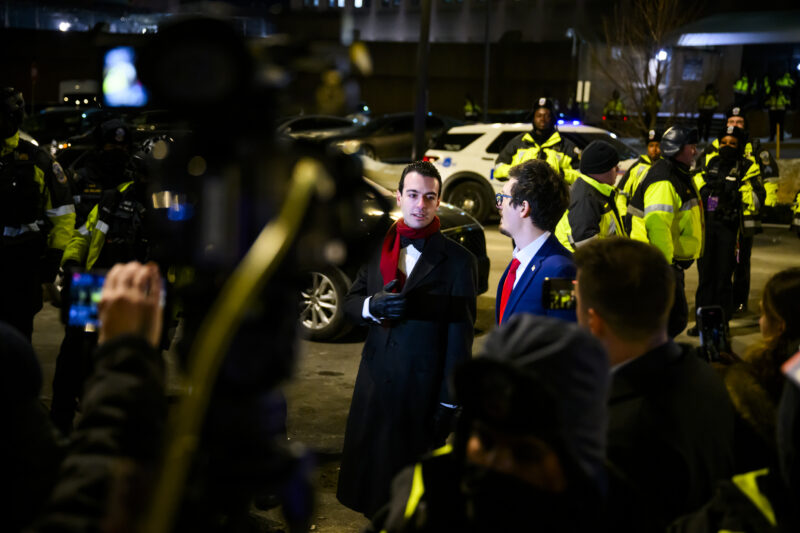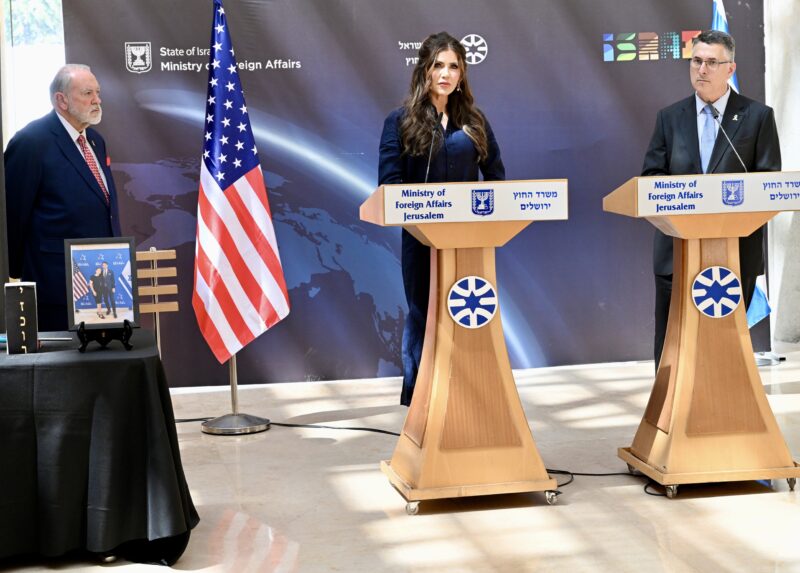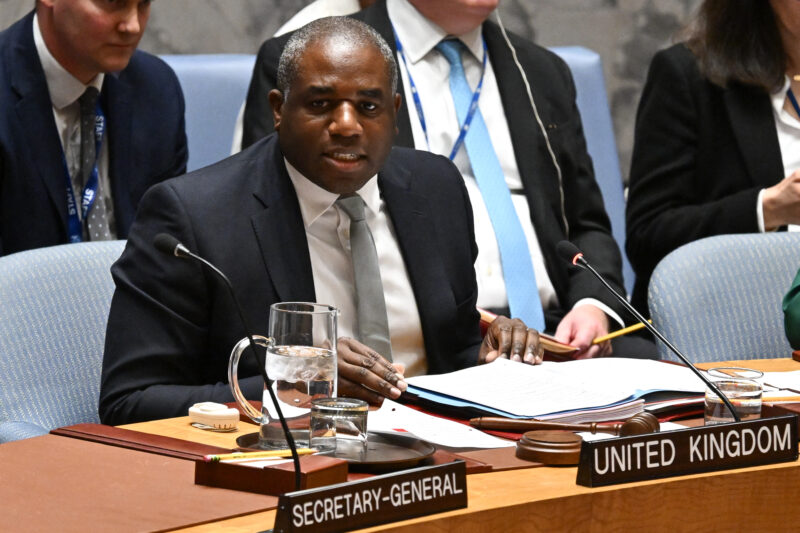Lawler centers Abraham Accords in approach to Middle East, antisemitism
The freshman lawmaker has become a frequent voice on Israel and antisemitism policy in his first months in office

Bill Clark/CQ-Roll Call, Inc via Getty Images
Rep. Mike Lawler (R-NY) leaves the House Republicans' caucus meeting at the Capitol Hill Club in Washington on Tuesday, May 23, 2023.
In his first six months on Capitol Hill, freshman Rep. Mike Lawler (R-NY) has established himself as a lawmaker to watch on Israel and antisemitism policy.
In just the past week, Lawler has spearheaded pieces of legislation that aim to clamp down on antisemitism on college campuses — a response to a recent incident at the City University of New York — and expand oil sanctions on Iran.
The first-term congressman’s district is among the most Jewish in the country, with a significant population of conservative-leaning Orthodox Jews who helped propel Lawler to an underdog win in November against then-Democratic Congressional Campaign Committee chief Rep. Sean Patrick Maloney (D-NY).
In an interview with Jewish Insider in his Capitol Hill office, Lawler tied his work to his “very good relationship” with Jewish voters across the religious spectrum in his district, rising rates of antisemitism in New York in particular and his own personal convictions.
“Nobody should ever be [a] victim to discrimination or hatred or violence because of who they are or what they believe,” Lawler said. “As a practicing Catholic, I believe very strongly in the principle of ‘love thy neighbor as thyself.’ And I think the objective, of course, is to really make sure that as a government that we’re doing right by people and communities, and that we are making laws that protect people.”
Lawler, who said he’s also working to “strengthen the relationship between the United States and Israel,” visited Israel for the first time last month on a trip with House Speaker Kevin McCarthy (R-CA).
Lawler said that discussions around expanding the Abraham Accords, combating Iran and concerns around the recent Saudi-Iranian detente brokered by China featured prominently in the delegation’s conversations with Israeli leaders. He centered the normalization agreements as a path to addressing a host of issues from security threats to Israel to antisemitism worldwide.
The freshman Republican, who sits on the House Foreign Relations Committee, argued that expanding the circle of normalization will be key to checking Iran’s advances and its nuclear program, in addition to continued military support for Israel.
“With our allies in the region, [we] really need to continue to build relationships to prevent it. That’s why the Saudis are critical, and why the Abraham Accords are so important,” Lawler said. “The more that the relationship between Israel and Arab-majority nations [is] normalized, and there are stronger economic ties and stronger national security ties, I think it really helps isolate Iran in the way that they should be.”
Lawler also predicted that the Abraham Accords will be “pivotal” in moving toward an eventual Israeli-Palestinian peace deal.
“If the Saudis and other Arab majority nations come to the table on this, I think it really will put the Palestinians in a position where they can choose peace and economic prosperity, or to continue down this path,” he said. “The Palestinian Authority needs to come to the table in a way that is focused on peace and economic prosperity.”
He did not voice support for any specific form of Israeli-Palestinian agreement, including a two-state solution, saying that the specific outcome remains “to be seen” and emphasizing that “it’s been talked about for a long time” without success. Lawler said he’s supportive of continued humanitarian aid to the Palestinians as long as strict oversight and accountability are maintained to ensure it does not support terrorism.
Lawler introduced legislation earlier this year urging the creation of a dedicated ambassador-level envoy for the Abraham Accords, which easily passed the Foreign Affairs Committee. He said that creating such a position would help bring Saudi Arabia to the table with Israel, “forcing the administration to take more direct action when it comes to trying to strengthen the Abraham Accords and grow them.”
Lawler described the Saudi-Iran deal brokered by China as “a message to the United States” and said “the president and the administration would be well-advised to act.”
Some of the potential American concessions Saudi Arabia has floated as part of normalization negotiations are likely to be problematic among Lawler’s Democratic colleagues.
“You have to take all of these requests into consideration and find areas of compromise,” Lawler said. “Nobody’s gonna get everything they want at any of these negotiations.”
McCarthy’s delegation to the Middle East also made a stop in Jordan — which maintains a complicated relationship with Israel and has been attracting increasing criticism over its reluctance to engage with the Abraham Accords, increasing relations with Syria and harboring of a terrorist wanted by the U.S.
“I think the Jordanian king is very aware of all the challenges and circumstances in the Middle East,” Lawler said. “Jordan has been, and continues to be, an ally in the region. And I think certainly, you know, more can and should be done to strengthen the relationship between Jordan and Israel.”
Lawler emphasized the need for a “coordinated response” across the federal government to antisemitism, although he had not yet seen the administration’s antisemitism strategy, which was released hours before his interview with JI.
Lawler particularly highlighted the need to push back on lawmakers and public figures promoting the Boycott, Divestment and Sanctions movement targeting Israel, which “contributes greatly to antisemitism… and frankly incites the hatred that we see.”
“Obviously defining it, confronting it, but also from a governmental standpoint, doing everything we can to effectively combat it, to support the State of Israel, to continue to promote economic investment and cooperation,” are key to stemming the tide of antisemitism, Lawler said. “And again, that goes back to why I think it’s so important for the Abrahamic Accords to flourish and to grow. You need to normalize relations with Israel. And I think in doing that, it effectively helps to mitigate some of the antisemitism that we see around the world, but even here in the United States.”
Politically, Lawler is among the most vulnerable members of Congress, hailing from a district that President Joe Biden won by a double-digit margin in 2020, which could turn a deeper blue if New York Democrats are able to draw more favorable maps ahead of the 2024 election.
Lawler — who has become a cable news staple and frequently found himself in the center of the news cycle — has often been a loyal soldier for Republican leadership since taking office, but he has also broken with his party on several prominent occasions.
He voted against Republican efforts to overturn administrative rules freezing tariffs on the import of solar panels, flipped against a GOP education bill when a provision was added targeting transgender students, and supports red flag gun laws and opposes federal abortion bans. Biden spoke positively about the congressman during a recent visit to his district.
Lawler’s also been considerably cooler about former President Donald Trump than many of his GOP colleagues, calling shortly after the midterms for his party to move on from the former president. Lawler spoke positively at the time about Florida Gov. Ron DeSantis.
Speaking to JI the day after DeSantis announced his presidential campaign, Lawler did not offer specific thoughts on either candidate.
“There needs to be a robust primary and discussion about the future and the party and where we want to go as a party, but the focus should be on the challenges we’re facing, and the future and the American people,” Lawler said. “And ultimately, Republican primary voters will decide who will be the nominee. So we’ll see how this process plays out.”















































































